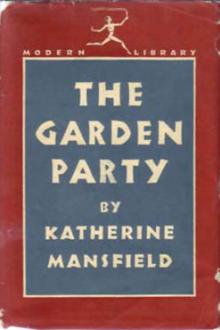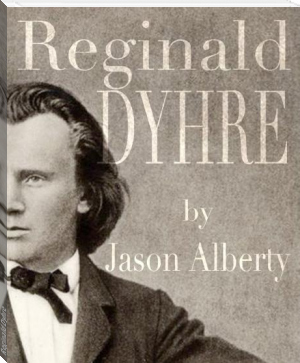Bliss - Katherine Mansfield (paper ebook reader TXT) 📗

- Author: Katherine Mansfield
- Performer: -
Book online «Bliss - Katherine Mansfield (paper ebook reader TXT) 📗». Author Katherine Mansfield
Whatever could it be? She had never seen anything like it before. She stood and stared. And then she saw her mother coming down the path.
“Mother, what is it?” asked Kezia.
Linda looked up at the fat swelling plant with its cruel leaves and fleshy stem. High above them, as though becalmed in the air, and yet holding so fast to the earth it grew from, it might have had claws instead of roots. The curving leaves seemed to be hiding something; the blind stem cut into the air as if no wind could ever shake it.
“That is an aloe, Kezia,” said her mother.
“Does it ever have any flowers?”
“Yes, Kezia,” and Linda smiled down at her, and half shut her eyes. “Once every hundred years.”
7On his way home from the office Stanley Burnell stopped the buggy at the Bodega, got out and bought a large bottle of oysters. At the Chinaman’s shop next door he bought a pineapple in the pink of condition, and noticing a basket of fresh black cherries he told John to put him a pound of those as well. The oysters and the pine he stowed away in the box under the front seat, but the cherries he kept in his hand.
Pat, the handy-man, leapt off the box and tucked him up again in the brown rug.
“Lift yer feet, Mr. Burnell, while I give yer a fold under,” said he.
“Right! Right! First rate!” said Stanley. “You can make straight for home now.”
Pat gave the grey mare a touch and the buggy sprang forward.
“I believe this man is a first-rate chap,” thought Stanley. He liked the look of him sitting up there in his neat brown coat and brown bowler. He liked the way Pat had tucked him in, and he liked his eyes. There was nothing servile about him—and if there was one thing he hated more than another it was servility. And he looked as if he was pleased with his job—happy and contented already.
The grey mare went very well; Burnell was impatient to be out of the town. He wanted to be home. Ah, it was splendid to live in the country—to get right out of that hole of a town once the office was closed; and this drive in the fresh warm air, knowing all the while that his own house was at the other end, with its garden and paddocks, its three tip-top cows and enough fowls and ducks to keep them in poultry, was splendid too.
As they left the town finally and bowled away up the deserted road his heart beat hard for joy. He rooted in the bag and began to eat the cherries, three or four at a time, chucking the stones over the side of the buggy. They were delicious, so plump and cold, without a spot or bruise on them.
Look at those two, now—black one side and white the other—perfect! A perfect little pair of Siamese twins. And he stuck them in his button-hole…. By Jove, he wouldn’t mind giving that chap up there a handful—but no, better not. Better wait until he had been with him a bit longer.
He began to plan what he would do with his Saturday afternoons and his Sundays. He wouldn’t go to the club for lunch on Saturday. No, cut away from the office as soon as possible and get them to give him a couple of slices of cold meat and half lettuce when he got home. And then he’d get a few chaps out from town to play tennis in the afternoon. Not too many—three at most. Beryl was a good player, too…. He stretched out his right arm and slowly bent it, feeling the muscle… . A bath, a good rub-down, a cigar on the veranda after dinner….
On Sunday morning they would go to church—children and all. Which reminded him that he must hire a pew, in the sun if possible and well forward so as to be out of the draught from the door. In fancy he heard himself intoning extremely well: “When thou did overcome the Sharpness of Death Thou didst open the Kingdom of Heaven to all Believers.” And he saw the neat brass-edged card on the corner of the pew—Mr. Stanley Burnell and family…. The rest of the day he’d loaf about with Linda…. Now they were walking about the garden; she was on his arm, and he was explaining to her at length what he intended doing at the office the week following. He heard her saying: “My dear, I think that is most wise…. ” Talking things over with Linda was a wonderful help even though they were apt to drift away from the point.
Hang it all! They weren’t getting along very fast. Pat had put the brake on again. Ugh! What a brute of a thing it was. He could feel it in the pit of his stomach.
A sort of panic overtook Burnell whenever he approached near home. Before he was well inside the gate he would shout to anyone within sight: “Is everything all right?” And then he did not believe it was until he heard Linda say: “Hullo! Are you home again?” That was the worst of living in the country—it took the deuce of a long time to get back…. But now they weren’t far off. They were on the top of the last hill; it was a gentle slope all the way now and not more than half a mile.
Pat trailed the whip over the mare’s back and he coaxed her: “Goop now. Goop now.”
It wanted a few minutes to sunset. Everything stood motionless bathed in bright, metallic light and from the paddocks on either side there streamed the milky scent of ripe grass. The iron gates were open. They dashed through and up the drive and round the island, stopping at the exact middle of the veranda.
“Did she satisfy yer, sir?” said Pat, getting off the box and grinning at his master.
“Very well indeed, Pat,” said Stanley.
Linda came out of the glass door; her voice rang in the shadowy quiet. “Hullo! Are you home again?”
At the sound of her his heart beat so hard that he could hardly stop himself dashing up the steps and catching her in his arms.
“Yes, I’m home again. Is everything all right?”
Pat began to lead the buggy round to the side gate that opened into the courtyard.
“Here, half a moment,” said Burnell. “Hand me those two parcels.” And he said to Linda, “I’ve brought you back a bottle of oysters and a pineapple,” as though he had brought her back all the harvest of the earth.
They all went into the hall; Linda carried the oysters in one hand and the pineapple in the other. Burnell shut the glass door, threw his hat down, put his arms round her and strained her to him, kissing the top of her head, her ears, her lips, her eyes.
“Oh, dear! Oh, dear!” said she. “Wait a moment. Let me put down these silly things,” and she put the bottle of oysters and the pine on a little carved chair. “What have you got in your button-hole—cherries?” She took them out and hung them over his ear.
“Don’t do that, darling. They are for you.”
So she took them off his ear again. “You don’t mind if I save them. They’d spoil my appetite for dinner. Come and see your children. They are having tea.”
The lamp was lighted on the nursery table. Mrs. Fairfield was cutting and spreading bread and butter. The three little girls sat up to table wearing large bibs embroidered with their names. They wiped their mouths as their father came in ready to be kissed. The windows were open; a jar of wild flowers stood on the mantelpiece, and the lamp made a big soft bubble of light on the ceiling.
“You seem pretty snug, mother,” said Burnell, blinking at the light. Isabel and Lottie sat one on either side of the table, Kezia at the bottom—the place at the top was empty.
“That’s where my boy ought to sit,” thought Stanley. He tightened his arm round Linda’s shoulder. By God, he was a perfect fool to feel as happy as this!
“We are, Stanley. We are very snug,” said Mrs. Fairfield, cutting Kezia’s bread into fingers.
“Like it better than town—eh, children?” asked Burnell.
“Oh, yes,” said the three little girls, and Isabel added as an afterthought: “Thank you very much indeed, father dear.”
“Come upstairs,” said Linda. “I’ll bring your slippers.”
But the stairs were too narrow for them to go up arm in arm. It was quite dark in the room. He heard her ring tapping on the marble mantelpiece as she felt for the matches.
“I’ve got some, darling. I’ll light the candles.”
But instead he came up behind her and again he put his arms round her and pressed her head into his shoulder.
“I’m so confoundedly happy,” he said.
“Are you?” She turned and put her hands on his breast and looked up at him.
“I don’t know what has come over me,” he protested.
It was quite dark outside now and heavy dew was falling. When Linda shut the window the cold dew touched her finger tips. Far away a dog barked. “I believe there is going to be a moon,” she said.
At the words, and with the cold wet dew on her fingers, she felt as though the moon had risen—that she was being strangely discovered in a flood of cold light. She shivered; she came away from the window and sat down upon the box ottoman beside Stanley.
…. .
In the dining-room, by the flicker of a wood fire, Beryl sat on a hassock playing the guitar. She had bathed and changed all her clothes. Now she wore a white muslin dress with black spots on it and in her hair she had pinned a black silk rose.
Nature has gone to her rest, love,
��See, we are alone.
Give me your hand to press, love,
��Lightly within my own.
She played and sang half to herself, for she was watching herself playing and singing. The firelight gleamed on her shoes, on the ruddy belly of the guitar, and on her white fingers… .
“If I were outside the window and looked in and saw myself I really would be rather struck,” thought she. Still more softly she played the accompaniment—not singing now but listening.
…. “The first time that I ever saw you, little girl—oh, you had no idea that you were not alone—you were sitting with your little feet upon a hassock, playing the guitar. God, I can never forget…. ” Beryl flung up her head and began to sing again:
Even the moon is aweary…
But there came a loud bang at the door. The servant girl’s crimson face popped through.
“Please, Miss Beryl, I’ve got to come and lay.”
“Certainly, Alice,” said Beryl, in a voice of ice. She put the guitar in a corner. Alice lunged in with a heavy black iron tray.
“Well, I have had a job with that oving,” said she. “I can’t get nothing to brown.”
“Really!” said Beryl.
But no, she could not stand that fool of a girl. She ran into the dark drawing-room and began walking up and down…. Oh, she was restless, restless. There was a mirror over the mantel. She leaned her





Comments (0)